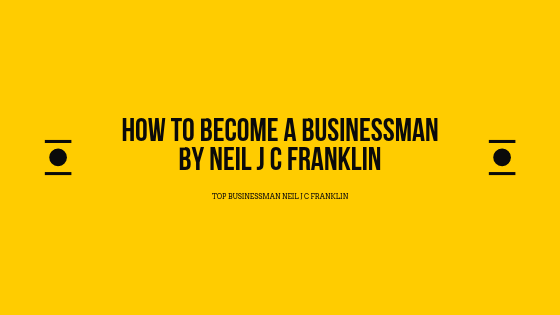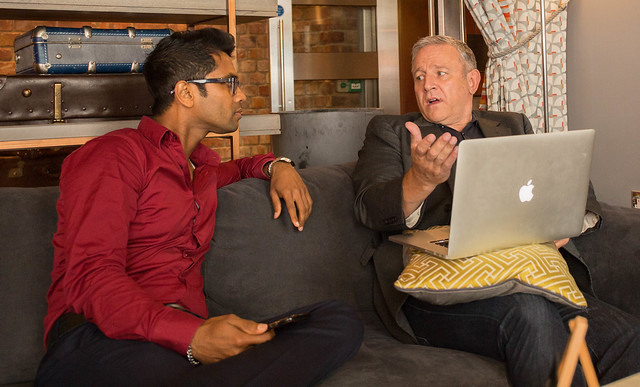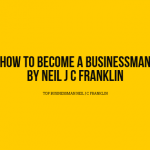How To Become A Businessman: Tips To Succeed in Business

The world of business certainly has its rollercoaster moments and as an entrepreneur and businessman, I have had my fair share.

To become a businessman, you have to be fluent in the language of business and in this article I will explain my own personal journey, with a few “awakenings.”
I class myself as both a businessman and an entrepreneur as per the first sentence; however, there is a huge difference in the “pure” definition, but also a huge overlap.

An entrepreneur is driven by an instinctive urge that often flies in the face of convention – ideas flow, risks are taken and businesses are easily won and lost.
It’s more of a way of life than anything else and a true entrepreneur would rather sleep rough on the streets than take a job and in the rare occasion that they would simply have to take one, they would probably be fired very quickly.
It’s like the story of the scorpion and the frog:
A scorpion and a frog meet on the bank of a stream and the scorpion asks the frog to carry him across on its back. The frog asks, “How do I know that you won’t sting me?”
The scorpion says, “Because if I do, I will die too.” The frog is satisfied, and they set out, but in midstream, the scorpion stings the frog. The frog feels the onset of paralysis and starts to sink, knowing they will both drown but has just enough time to gasp “Why?”
“It’s my nature,” replies the scorpion.
Now let’s get to business as the saying goes!
The Business of being unemployed
When I was fifteen, I attended a careers advice session in my school and was told by the advisor after a very brief assessment that there were three-million unemployed people in Britain and one unemployable:
Me!
That statement fuelled my innate entrepreneurial spirit and I had to seriously think about my career options.
Leaving college with the qualifications I should have had when I left school, did nothing for my academic confidence and after my first job of knocking on people’s doors trying to sell them home improvements, gave me a short, sharp introduction to sales, which became my main skillset throughout my life ever since.
I went from job to job, trying to find happiness and in a world where jobs were hard to get, except direct sales jobs, or lowly paid commercial sales jobs in industries where the majority of people failed.
My life changed when I entered the world of recruiting and staffing – soon I fell in love with the industry and never looked back.
After a couple of jobs and then my first attempt of running a company and failing, I found myself ready to start my own company in the technology staffing sector and from my apartment in South London, UK.
I started the company with very little capital, no business experience, and a strong will to succeed, which saw me grow the company from zero to around $60m in under ten years.
The world of businessman
 Let’s turn our attention now to the word “businessman” and what does it mean.
Let’s turn our attention now to the word “businessman” and what does it mean.
We can look at the definitions, but we will get to the issue of running a business later through my story and here is where we part company with the entrepreneur, if only temporarily.
Many bright young people leave school, go to college and then achieve a business qualification such as an MBA.
From here they could enter a company and work their way right up to becoming the CEO of that company and take a few more CEO positions before retiring gracefully and looking back on such a rewarding experience.
Look at the famous CEO of General Electric (GE) – Jack Welch.
Welch was a legend, no matter what anyone thinks of him and he is a true example of a businessman. He transformed the company during his tenure and had a streak of perfectionism that was unrivalled at the time.
There are many CEO’s like Welch and many junior executives who are working their way up through the ranks to emulate him or others they admire and you don’t even have to be a CEO, because there are many other successful businessmen who don’t make it to the dizzy heights of being a CEO, but who are nevertheless successful.
What about the ground between a businessman and an entrepreneur?
Well, every entrepreneur by default is a businessman simply because of the fact they are in business, but not every businessman is an entrepreneur.
Take Lord Sugar for example – he is both an entrepreneur and a hugely successful businessman. Starting from humble beginnings selling goods in the East End of London, he now runs a huge successful corporation and equally, there are many CEO’s and executive leaders who have a tremendous amount of entrepreneurial flair.
There is clearly an overlap, but I will say that many businessmen and women that I have spoken to over the years, will firmly state that they are not entrepreneurs and stick to their educational training, to give the foundations for the “language of business,” such as an MBA and progress through the corporate ladders of success.
I challenge them because I will always state that there is a little bit of entrepreneurship in everyone…well, I would say that, wouldn’t I?
My Business Awakening
Now as the CEO of my company, I am the figurehead and at the forefront of my business and quite simply, the buck stops with me.
However, I would always describe myself as a “sales focused CEO” and not a “numbers focused CEO.”
I had observed that many of my clients, had CEO’s from differing backgrounds and for example, some came from the role of the Chief Finance Officer (CFO). The point being that if you look at the two really essential components of business and here I am excluding research and innovation, etc. then it boils down to being able to make sales and collect the cash.
If then, you had a sales-focused CEO, you would need a strong numbers right hand man and not necessarily the CFO.
In my case, I had a strong CFO and a strong Chief Operating Officer, COO.
The reason for the COO, was to bridge the gap between a pure “numbers” person and myself, who is a pure salesperson – the gap was in the understanding of both sales and finance, but also the workings or operations of the company.
But let me explain how I got there!
In the early days, I was winning clients through pure entrepreneurial flair and salesmanship, but I didn’t have the cash to hire anyone to perform the normal tasks that are associated with running a business – bookkeeping, record-keeping and among others.
So I would spend days selling and the evenings and weekends learning the basics of running a business.
Back to school
With my lack of academic qualifications, I had no choice but to go out and learn.
Thankfully I love to read books, simply to learn…anything. But now I could hear some other words echo over and over in my head:
“The harder you work at school, the easier it is in life,” and “make the most of your school years because you can’t get them back.”
So if by chance, you are reading this whilst still at school, remember the words above as you will only regret it later.
I remember giving a talk to my old school saying exactly the same words to group kids in their final school year, but most were dismissive of my comments, although I did get a lot of “thanks” from the parents.
So armed with my new accounting basics books, I started to learn the hard way and painstakingly worked my way through what accountants would term as the accounting “alphabet.”
But I had no choice.
It didn’t stop there because I also had to familiarize myself with legal and compliance issues, so I was lucky enough to have dealt with a lawyer in my first business, who I could at least phone up for help, but I could only do this for so long as I wouldn’t want to presume on our relationship.
However, I needed more than his expertise as my business was about to expand Internationally – now you may think “where is all the cash” if I could even think about expanding?
But the simple answer was that it was trickling in – I had sold loads but collected very little.
Time to look at the cash flow section of my accounting books and also learn about the term, “credit management!”
But I still needed to solve the legal issues without the cash to be able to afford two lawyers so I came up with a solution.
I would take the two of them for lunch and kill the proverbial two birds.
I thought it was a stroke of genius; especially when they both accepted and I couldn’t wait for the lunch appointment.
However, I hadn’t bargained or budgeted for the fact that the lunch would be mainly liquid! The lunch was fantastic and information was freely flowing, in fact perfectly in time with the wine and all I could think about was the damage it was doing to my credit card.
The outcome was to confirm my work of genius – I was too drunk to remember the conversation and the bill in the restaurant was far more than the bill for the two of them in their office!
Still, nothing a simple follow up phone call wouldn’t solve…if, of course, they could remember anything.
I was firmly learning that the art of business was far more important (to me at the time) than being an entrepreneur and top-flight salesperson.
The customer is always right!
Here is a true story to mark for me, what I will use as a benchmark to this day, regarding my realization that being an entrepreneur was in no way enough; I needed to be a businessman:
It was a cold wintery day as I was leaving for Holland from London.
My business partner and I were “summoned” to a meeting in The Hague headquarters of our client who we were doing great and profitable business with…at least in our opinion.
We met in the client’s “war room,” or their nerve center of all operations; where innermost secrets and strategies were discussed.
The meeting was set for 5:30 pm and that I thought was slightly unusual as most of their previous meetings had been mornings or in the early afternoon.
Our contact had phoned in the previous week to let us know that we would be contacted by another gentleman who would be “helping them” streamline their processes and procedures and as expected the phone call came with a firm introduction and the formal invite to the meeting…it went something like this:
“Good morning Mr. Franklin, my name is xxx and I would like you to meet us at 5:30 pm next Monday evening at our headquarters in The Hague.”
I tried to ask a few questions in the usual manner and was met with:
“Nice to speak with you and see you on Monday evening.”
I tried to get more information from our main contact, but couldn’t reach him, which was not unusual as these guys were working crazy-long hours and under stressful conditions.
My partner and I thought little about it as we already engaged at a very senior level, had done some very straightforward business deals, over a good period of time and that was a monumental mistake, Numero Uno!
At the meeting and after the formal introductions, I was slightly taken aback when I noticed that our new contact was working for a major international accountancy firm and he then told me that the sole responsibility of all hiring and firing came down to him!
In the war room that evening, we were shown some statistics about our business performance against that of our main competition.
To our surprise and quite frankly our total astonishment, we were the least performing company, hence why we were summoned.
But after this “welcome,” he asked me to present my company and explain why we should continue to be an “approved” supplier, which was like throwing a red flag to a bull, or my ego at the time!
I patiently explained the value proposition and led with the message as I will explain later and the way you must do it. He listened intently, made a few notes and then told us that he had arranged a beer for us with our original contact.
Now I was really taken aback.
In the bar where we met my original and main contact, I couldn’t believe it when my latest friend had started to sell my company as the one they should use primarily.
You would have to have been there to see the look on our faces as we believed we were already connected, but this guy was validating everything that I said, which was unreal, considering the tone of the reason for the meeting.
After more than a few beers we moved on from The Hague to Amsterdam and a very nice Indonesian restaurant.
Now our original and main contact had not joined us and we were in the company of Mr. accountant and he then told me that he was extremely fond of wine and proceeded to order several (and I mean several) bottles of very nice Alsace wines, which he told us complimented the food.
After a long dinner we proceeded to visit a few bars in Amsterdam until the early hours of the morning, around 3:am. I was probably running on adrenaline and kept up with this mad accountant!
Now Amsterdam, as you know, is a very liberal place and one that you cannot get bored in – our friend had taken us around on a tour of the famous squares and bars, consuming a few beverages ranging from Russian or Swedish mineral water with a little vitamin C, to the Dutch beers and a taste of their version of gin – jenever.
As we said our goodbyes, he calmly took me to one side and asked:
- What is your turnover
- What is your operating margin
- What is your net margin
- How much of your turnover is with us
- What are your predicted financial results for the year
- What are you forecasting for the next financial year
- Please explain to me your vision for the industry
- Why should we continue to deal with your company
Talk about having to sober up very quickly and luckily I managed to do so.
I answered his questions to some degree at least, because we kept and developed the account, but I had learned a very valuable lesson.
You need, as the Scouts say, to “be prepared.”
But that is half of the story and the greatest lesson I learned from that meeting was that I should have done my research, my due-diligence.
I vowed never to be in that position again and I will tell you that research is the key to great selling, not sales techniques.
That night shaped my entire thinking and although I went into “shock” my instinct kicked in and somehow I was able to survive.
They say everything happens for a reason and I cannot thank the gentleman enough for giving me that short, sharp and very well-timed shock that evening in Amsterdam.
Time to get “business serious”
I don’t do anything in half measures and for me, you are either “in” or you are “out.”
You cannot be half pregnant.
It was time to go “all in” and learn the business side of entrepreneurship and I knew that in my heart, I could not discipline myself to go back to college and study for an MBA, so I had to do the next best thing, in my situation and at that time.
I had ironically changed my firm of accountants because I felt that the partner in charge of my account was not entrepreneurial enough and through recommendation, I was introduced to a firm in the City of London.
I met the managing partner after a very nice Thai meal and a just a few samples of the local brew and how I was able to hold a conversation, I will never know to this day.
But we arranged a follow-up meeting and soon I appointed them as my advisors and the wheels were set in motion for a twenty-year business, legal and financial learning journey that you could not buy for all the money in the world.
I eventually invited the managing partner to join my company in an advisory capacity and he had the task of bringing all of our operational processes and procedures up-to-date.
This was no easy task as we had grown dramatically and that meant there was a gap to fill between my sales efforts and the true reality of where we were.
Now when I say “gap,” it was more like the Grand Canyon and my only regret is that I didn’t meet this man earlier in my career, as the outcome would have been very different.
To label this man as an accountant would do him a massive injustice – I have seen him tie lawyers in knots, as well as members of his own profession, but what I really liked and admired, was that he was prepared to fly with me to meet clients and see things from the “sharp end.”
This “partnership” proved to be a great one as I had someone to learn from, although we clashed fiercely!
It started with politics as we were on two totally opposing sides of the equation, but we learned to live with our views and that is a healthy balance, but what I learned from this man, was how to conduct business.
I learned later in life a massive lesson – I have always treated people as fairly as I could and when I had my first child, he told me to treat people as you would want your own daughter to be treated!
Wise words.
Now I was learning the business from a real businessman – he was running his own firm and ran it like a business, plus he was a business consultant, aside from being a qualified accountant.
Through this man and a few others, I started to be far more conversant with legal and financial matters, which enabled me to structure deals in ways that I had never thought possible before.
Commercial awareness
Selling is the lifeblood of every organization and in my current role as a coach and mentor, I see many people who advertise themselves as “salespeople,” but to me, they are missing a huge chunk of selling and that is the business aspect.
So if you are a salesperson today, then please make sure you understand the business aspects and implications of what you are selling.
You have to become a businessman.
The way to bridge the gap between sales and business is to understand the term “commercial awareness.”
The definition does it the correct justice and before you assume that all salespeople, especially in the corporate world understand the business, let me tell you that most don’t, but this is a little “side dish” to the article as I am a salesperson as well as an entrepreneur and like the scorpion…
You simply cannot have enough commercial awareness and if an MBA is a way to learning at the very least, the “language of business” (it is far more than that of course, but I like keeping things simple), then practical commercial awareness is the vehicle to get it out into the world of commerce.
In some ways, I was extremely lucky in being forced to be a businessman, but that is also down to my personality, so let me give you a little advice here:
You may be the most flamboyant entrepreneur, the most successful salesperson and run a hugely successful enterprise, but let go of any thoughts to “outsource” the components of the business to your employees, you must get that knowledge yourself, no matter how basic it is.
Force yourself to learn, just as I am now forcing myself to learn the intricacies of Internet Marketing. It is torture for me at 55, but I know that I must do it and I have a great mentor by the name of Fernando Raymond, who quite frankly, gives me hell!
Heed these words.
When things go wrong
In the late 1990s, we were in the biggest technology boom that I think existed – nobody would talk about anything else other than how it is going to continue.
However, there were some people saying that it was time for a “correction” and that correction came fast and furiously, it hit us like a bomb.
The downturn of the early 2000s saw a dramatic decline in the need for technology staff, which was the backbone of what we did and our clients were reducing their workforces’ by up to 50 percent and to add to the misery, they were extending payment terms up to six months from the receipt of the invoice, if they were paying us at all.
Many of the famed start-ups at the time had gone bust and things were looking very poor.
At the time, I had just spent a fortune on refurbishing our offices in London and also signed a huge lease for $1m in Dallas, Texas.
Here is another thing – I had just bought a restaurant because as a businessman, I wanted to expand my empire and although I loved to cook and eat, it was always from the “customer side.”
I was ill-equipped to run a restaurant and I will tell everyone now, if you are going to go into a business that is not in your area of experience, but you are at least an experienced businessman, then make sure that you spend all of your waking hours in that business, so that you can learn first hand.
I did not and it resulted in me having to close it because I had to get my company and employees out of the trouble we were now in, because of the recession.
Take a leaf out of Jack Welch and his mantra for non or underperforming business divisions:
- Fix
- Sell
- Or close
I had to take the closing option because for sure, nobody would have bought it and I had no time to fix it.
For the next ten years, I worked hard to restructure the debt we had in the company and the easiest thing for me to do would have been to drop the lot and start again, but that is not my style.
Business in America
In 2005, I decided to relocate my company to Dallas, Texas and that was in response to the growing market demands of the US.
The recession had largely wiped out European investment, but the US had a much brighter outlook.
Arriving in Dallas in 2005, I immediately immersed myself into the culture and along I had also started another technology software business, deep in the heart of the recession and here again details the difference between the pure businessman and entrepreneur.
Most businessmen would have never started such a venture, especially with a limited amount of capital and debts.
Who is right?
It is am an impossible question to answer as many risks pay off, but in this case, when I look back, it is clearly the pure businessman.
Arriving in Texas now gave me another challenge and that was how to do business in America and it was a far different proposition from what I knew.
If you are a pure entrepreneur and you land in America, you will have landed in your dream destination – you can do deals very easily, provided what you have “stacks up” and if you fail, you simply “dust yourself down” and try again.
But ignore the business laws at your peril, just as you would when doing business in any country.
The problem with America is that State laws differ and that is where you need expert advice and of course getting this advice costs!
I was there to grow my business and my entrepreneurial flair was welcomed, but again, I was now in learning mode once again.
We were still paying off debts from our expansion plan before the recession and to add to it all, we were named in a class action lawsuit, which hit our entire industry and most of the companies in it!
These are the type of lawsuits that can come from anywhere and in the problem with these is that you simply have to defend them if you are a corporation and that means paying a huge amount of legal fees.
As both an entrepreneur and businessman, this once again detracted from my true role as a sales-focused CEO and I was now dealing with pure business matters and they were taking up nearly all of my time.
So if you do business anywhere outside of your home country or territory, make sure you get specialist advice and research it from your own perspective.
As well as America, I had also conducted business in most parts of the world and that brings me to another specialist area of in the business world – taxation.
This is a hugely specialist area that needs specialist advice, but you need to address this upfront before you start to trade and I made the mistake of doing it the other way round.
It didn’t do me any favors and took a huge amount of man-hours to correct, which also means cash!
So, in summary, how do you become a businessman?
The easy answer is to do everything I didn’t do!
In all seriousness, if I were looking back on my career, I would have spent far more time paying attention in school. Also, I would have probably taken some form of business course alongside to compliment my entrepreneurial and sales natural abilities.
There are many such courses available today and it’s never too late to learn, but a lot easier to do it sooner rather than later.
Once you have learned the business language it is time to put it into action and if you want to be a businessman in the true sense of the word, then I suggest working for a large corporation to learn about each business function and more importantly, how they interact with each other.
You will have plenty of opportunities to start a business now and in the future, so don’t rush into it – it is like learning any language, you have to get the basics and then practice daily.
The divide between entrepreneurship and business is shrinking and many entrepreneurs like myself will have to spend far more time learning about the language of business and business people will have to adopt entrepreneurial thinking if they want to differentiate.
But, you have to take the first step and get started…today!

Business Coaching and Mentoring by Neil J C Franklin
Author Profile
- Award-winning entrepreneur from the United Kingdom. Neil Franklin is a business coach and a mentor helping business owners grow their businesses with high-performance business coaching.


